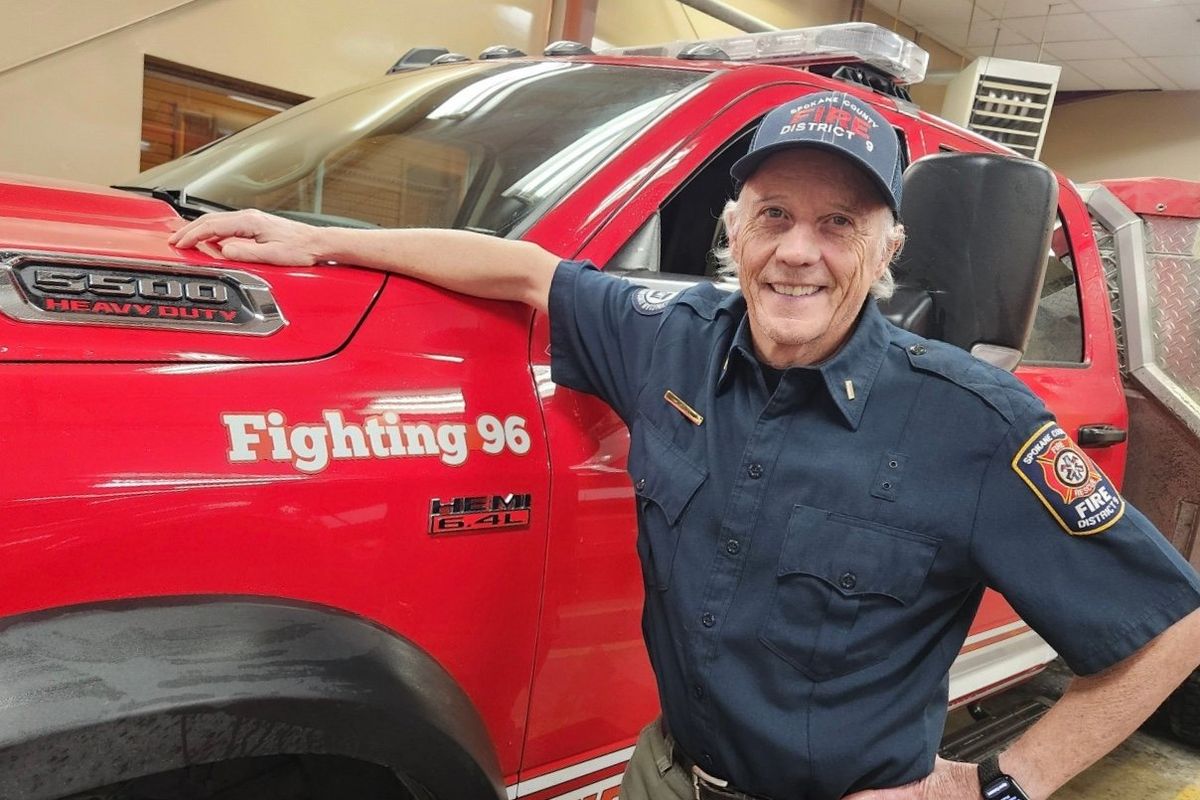‘On My Way!’ a reflection of a longtime volunteer firefighter, first-responder

Growing up in Providence, Rhode Island, Dan McCann loved visiting his dad at work. His father was a firefighter, and McCann enjoyed climbing all over the big red trucks.
However, the allure of higher education captivated him, and he spent much of his adult life teaching in university classrooms.
When he moved to Spokane to accept a position at Gonzaga University, he learned a colleague was a volunteer firefighter.
“I didn’t know there were volunteer fire departments all across the country,” he said. “I joined because I thought it was a great opportunity to understand my dad and the work he did.”
That was 28 years ago, and McCann is still answering calls for Station 96 in the foothills of Mount Spokane.
In January, he published “On My Way! A Volunteer Firefighter/EMT’s Story.”
With 25 short and immensely readable chapters, the 179-page book offers a glimpse of the challenging work volunteer firefighters do to support the safety and well-being of their communities.
“It’s not about the excitement, it’s about helping people in need on what’s often the worst day of their lives,” McCann said. “That’s when we’re needed most.”
From auto accidents to wildfires to medical emergencies to structure fires, McCann and his fellow volunteers answer calls for help.
Much has changed over the years, including the way those calls come in.
“In the early days, we all wore pagers,” he said. “Now we use our phones and get a text with information and a map.”
His usual response to calls provided the title for his book – “On My Way!”
Though he’s responded to more emergencies than he can count, there are some he can’t forget.
“Some calls stay with you forever,’ he said.
McCann writes of performing CPR on a 16-year-old girl who’d shot herself in the abdomen. Despite their efforts, she died on the ground in her parent’s garage.
Years after this call, I still feel unsatisfied with what we did that day. Who was she? Why did she do it? Could we have done anything more?
“Writing this book was cathartic for me and the other guys,” he said. “It forced us to piece together and process calls.”
He devotes a chapter to his interviews with six Station 96 volunteers, providing a window into their backgrounds, motivations and skill sets. The book also includes color photos of the crew and some of the fires they fought.
Not all the calls they answer are tragic. Some are simply confusing. Like the time the crew responded to a motorcycle crash. The concussed driver sat beside the road, his helmet next to him.
“Where’s my girlfriend,” he asked softly as he turned his gaze up to me, wrote McCann.
Emergency responders searched a large field near the crash scene, believing that the driver’s girlfriend had been thrown from the back of the bike. However, they later learned that the driver’s girlfriend was safe at home and hadn’t been with him.
Of course, there are fires. McCann writes of donning 45 pounds of gear to battle blazes.
In a chapter titled “The Christmas Fires” he writes of a close call at a structure fire.
“There was no visibility,” he recalled. “We couldn’t see or move about.”
He made the call to back out. A short time later, the structure “went up like a firecracker.”
“That’s how people die,” he said.
McCann retired from Gonzaga in 2020, but he continues to volunteer at Station 96.
In 2021, our station had 167 emergency calls, and I responded to 84% of them, he wrote. Going to those calls was sometimes the best part of my day. Sometimes it was the most difficult.
At 69, he knows it will soon be time to turn in his gear, but he wonders who will take his place. By 2023, Station 96 had just six volunteers. According to McCann, this is largely because there are more career firefighters working, which reduces the need for volunteers. However, in rural areas, volunteers are often the only immediate first responders available.
The time commitment is also significant.
Spokane County Fire District 9 provides the initial 12-week training twice yearly. After that, there’s required EMT training offered online.
“We are all EMTs,” he said. “About 80% of our calls are medically related.”
While driving through the foothills of Mount Spokane, memories of the people he’s assisted flood his mind.
“It’s very rewarding – even the smallest things like getting someone to feel calm and breathe better,” McCann said. “It’s a challenge, but it’s the most meaningful thing I’ve done.”
“On my Way!” is available at Auntie’s Bookstore and on Amazon.
Contact Cindy Hval at dchval@juno.com